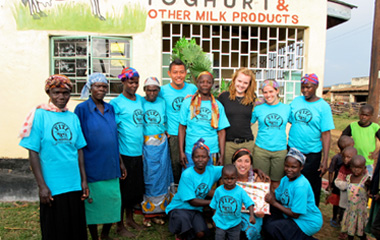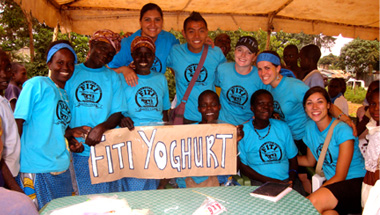About Us
Donate
Support Western Heads East by giving a financial gift here. To learn more about how your donations can help, please visit our Financial Gifts page.
Western Heads East Program
Western Heads East is a collaboration between Western staff, students, faculty and African partners using probiotic foods to contribute to health and sustainable development.
Largely through probiotic
Probiotics are live microorganisms which, when administered in adequate amounts, confer a health benefit to the host. Western Heads East uses a particular strain called Lactobacillus rhamnosus GR-1. This strain was isolated in 1981 in Kingston, Ontario. GR-1 was then studied by Dr. Gregor Reid, Dr. Andrew Bruce and others to the point where it is one of the world's most documented probiotic organisms.
Dr. Gregor Reid, Scientist at Lawson Health Research Institute and Professor of Microbiology, Immunology and Surgery at the Schulich School of Medicine & Dentistry at Western University collaborated with Dr. Sharareh Hekmat, Professor at Brescia University College, to develop a probiotic yogurt using the GR-1 strain.
With the inception of Western Heads East in 2002, we introduced Africa's first probiotic yogurt. In 2004 Tukwamuane Women's Group, who named the probiotic yogurt 'Fiti', started the first community kitchen in Mwanza, Tanzania. Today, there are more than 200 community production units in Tanzania, Kenya and Rwanda, which are largely owned and operated by women's groups. Western Heads East collaborates with our partners on research, teaching and service; and local community members own and operate the social enterprises.
Research has shown that Fiti probiotic yogurt can confer health benefits such as:
-
Preventing and treating gastrointestinal infections
-
Increasing birth weight in babies and mother's health
-
Helping to remove toxins such as mercury from the body
-
Strengthening the immune system and improving general health and nutrition
These effects are particularly pronounced in areas with high rates of malnutrition and for individuals who are immune compromised.
From just one Fiti probiotic social enterprises in Mwanza, Tanzania in 2004, the program has grown to 50+ social enterprises now in the Mwanza region. Western Heads East continues to work with host partners to establish social enterprises in Tanzania, Kenya and Rwanda. Since the program began, more than 100 student interns have collaborated with African partners to conduct research, examine health benefits, quality control, public health education, etc., to continue improving the social enterprises.

The Fiti Probiotic Foods Social Enterprises are owned and operated by local women and youth groups. The program’s African teams are comprised of local women’s groups ("Yogurt Mamas"), research institutes, hospitals,
The program’s Canadian team collaborates with African partners on research, knowledge translation, fundraising, best practices for probiotic foods production, quality control procedures and sustainable business education. The Western Heads East internship program provides an exciting and challenging opportunity for students at Western to work with African partners on program goals and research. Western Heads East interns have been from all faculties at Western including health science, science, social sciences, food and nutrition, nursing, medicine, business, education, among others. While contributing to local goals, the internship provides practical hands-on experience related to one's studies and a challenging opportunity for students and faculty to grow.
The goal of the internship program has also been for students and faculty to return and promote education about the program, health and social justice issues in Africa, their personal
Our interns have developed relationships with communities in East Africa leading to:
-
Establishment of a health program based on cow milk and
yogurt production -
Establishment of the groundwork for probiotics research
-
Promotion of awareness in Western University's community about health and social justice issues in Africa
The project holds promise and considerable benefits for all those involved, such as:
-
Improving the health and economic status in communities
-
Improving maternal health and general nutrition
-
Particularly pronounced positive health effects for persons living with HIV/AIDS
-
Providing campus awareness of, and involvement in, collaborative international efforts and research
-
Developing ethical and civic responsibilities with students
-
Providing experiential learning opportunities
-
Increasing critical and ethical globalization of Western activities
-
Cross-discipline collaboration


